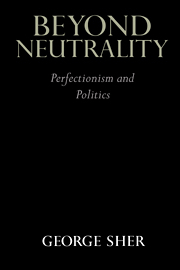1 - Introduction
Published online by Cambridge University Press: 14 November 2009
Summary
In this book, I shall present a view about government and the good life, one intermediate between two familiar extremes. At one extreme are views that the connection between government and the good life is internal – that living well requires governing as well as being governed, as Aristotle thought, or that the state exists to realize some other vision of the good. At the other extreme is the view that there is no connection between government and the good life – that the state should simply be neutral toward all conceptions of the good. Between these extremes, there is room for a third type of view, one that does not seek to ground the state in any particular conception of the good, but nevertheless holds that a government may legitimately promote the good. The view that I shall advance is of this third sort. To defend it, I must defuse the main reasons to deny that the state may seek to promote the good; to motivate it, I must develop a conception of the good that is worth promoting. These, accordingly, are the book's two main aims.
In recent years, many who call themselves liberals have maintained that the state should not favor, promote, or act on any particular conception of the good. Instead, it should simply provide a neutral and just framework within which each citizen can pursue the good as he understands it. To provide this framework, a government must sometimes interfere with liberty.
- Type
- Chapter
- Information
- Beyond NeutralityPerfectionism and Politics, pp. 1 - 19Publisher: Cambridge University PressPrint publication year: 1997



